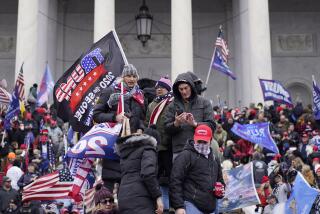Terror Case Unproved, Former Juror Says
- Share via
SACRAMENTO — A juror released from duty in a federal terrorism case said Wednesday that prosecutors have failed so far to prove that a 23-year-old Lodi man attended a terrorism training camp in Pakistan.
“I don’t think at this point in time the government has made its case,” said former juror Andrea Clabaugh, 37, a Sacramento engineering company account manager.
That a juror was unconvinced of guilt five weeks into the trial is bad news for prosecutors, who expect to wrap up their case against Pakistani American Hamid Hayat and his father, ice cream vendor Umer Hayat, 48, early next week. The defense, which plans to present its own slate of expert witnesses, has not begun its case.
The younger Hayat is accused of attending a training camp in Pakistan’s North-West Frontier Province in late 2003. Both men are accused of lying to federal agents about whether Hayat was at the camp.
Clabaugh said she was troubled by the way FBI agents appeared to “badger” Hamid Hayat during a marathon, late-night videotaped interrogation last year, at the end of which Hayat admitted having attended a camp.
“I felt that, in some respects, he was giving the information because they refused to believe that he didn’t know anything,” Clabaugh said. She said the agents appeared to be coaching Hayat.
“I didn’t see him volunteering anything,” Clabaugh said.
Clabaugh was dismissed shortly before noon Wednesday in a ruling by U.S. District Judge Garland E. Burrell Jr. because -- during the jury selection process at the beginning of the trial -- she failed to disclose that she once dated a Sacramento law enforcement officer. Calling it an oversight, she later volunteered the information.
Clabaugh was replaced by an alternate.
Interviewed by reporters in a hallway outside the federal courtroom, Clabaugh said she was alarmed by some of the evidence -- particularly secretly recorded conversations between Hamid Hayat and Naseem Khan, the FBI’s paid informant.
Khan, a former Bend, Ore., convenience store clerk, was recruited by the FBI in 2001 to infiltrate the large Muslim community in Lodi, the Central Valley farm town south of Sacramento where he once lived. The FBI provided Khan a car and paid him about $230,000 in salary and expenses for his services between 2002 and 2005.
The tapes, recorded in early 2003, show Hamid Hayat extolling militant Pakistani Muslim leaders and speaking glowingly about Al Qaeda while ridiculing the FBI and other U.S. institutions.
“It was frightening to hear those tapes,” Clabaugh said. “Lodi is very close to us.”
She also said Hamid Hayat, a thin, bearded man who slumps silently in the courtroom while listening to proceedings with earphones to an Urdu-language interpreter, “looks like someone who would fit the description of a terrorist.”
But to her at least, none of the evidence the government has presented so far has been strong enough to merit conviction.
She said Hamid Hayat’s fiery rhetoric in the recordings could be explained as an attempt to impress the informant Khan, who is nine years older and who represented himself as a family friend and confidant. “It could have just been a young guy trying to impress an older guy,” she said.
Clabaugh also said she found Khan’s testimony that he saw a ranking Al Qaeda leader in a Lodi mosque to be “a little far-fetched.”
“That doesn’t mean it is impossible,” she added.
Khan’s sensational claim to have seen Al Qaeda No. 2 Ayman Zawahiri attending the Lodi mosque in 1998 and 1999 has been discounted by terrorism experts, who say it is unlikely that Zawahiri visited the U.S. after 1995. However, jurors in the case, including Clabaugh, did not have that information.
A scrapbook of newspaper clippings the government presented to show that Hamid Hayat was an avid follower of terrorist movements also did not impress Clabaugh. She noted that many of the articles featured his grandfather, a well-known religious leader and politician.
“It made sense that he would want to keep a record of his grandfather,” she said.
Clabaugh said she found an Arabic note discovered in Hamid Hayat’s wallet calling for vengeance against enemies of Islam “a little more condemning, but it does not prove anything other than he carried a note. As far as I know, carrying a note is not a crime.”
At the end of her more than four weeks’ participation in the trial, Clabaugh said, she came away thinking that Hamid Hayat was “a young man interested in possibly hurting the United States or enemies of Islam.” But, she said, she “did not see anything” that proved he did what prosecutors said he did.
More to Read
Sign up for Essential California
The most important California stories and recommendations in your inbox every morning.
You may occasionally receive promotional content from the Los Angeles Times.













